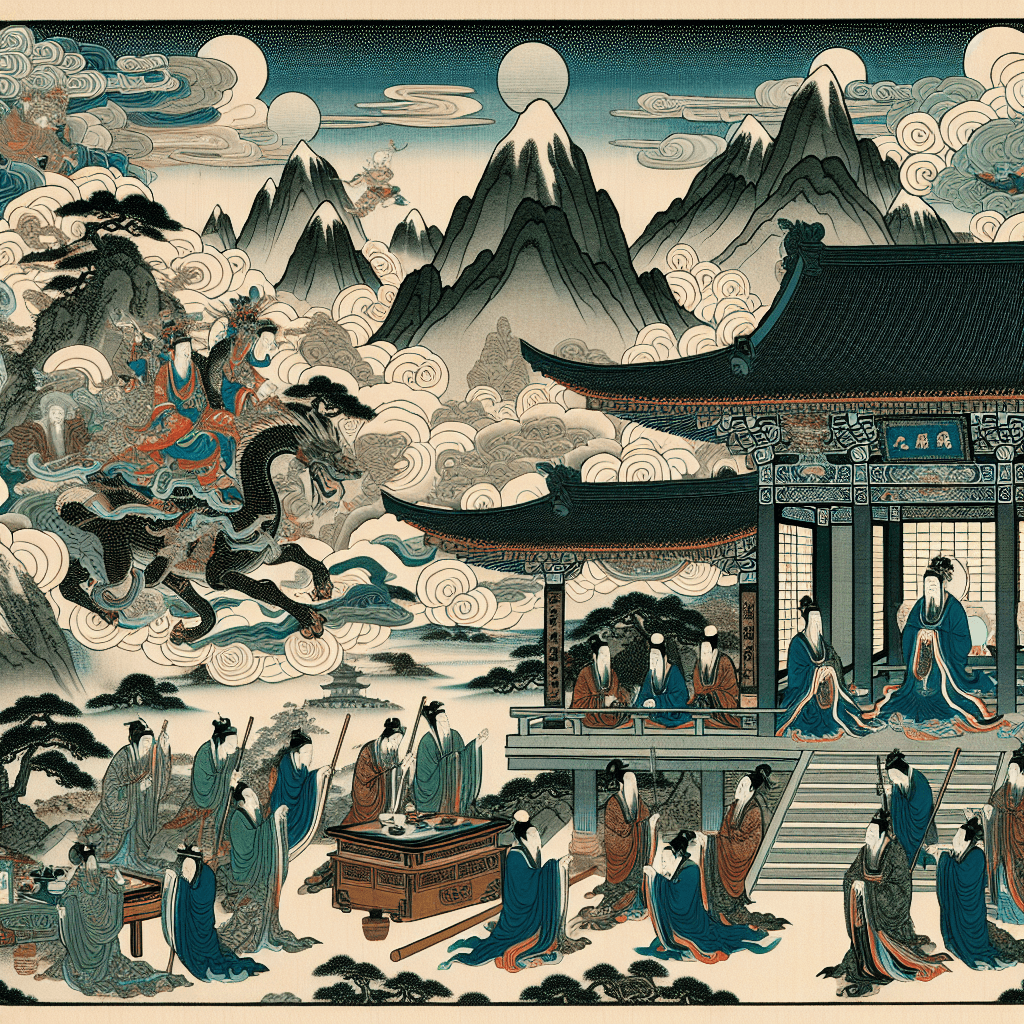

syndu | Feb. 20, 2025, 6:33 p.m.

The Mandate of Heaven, or "Tianming" (天命) in Chinese, is a foundational concept in Chinese political philosophy that has profoundly influenced the governance and legitimacy of rulers throughout China's history. This doctrine asserts that Heaven grants the right to rule based on moral virtue and the ability to govern effectively. During the Ming Dynasty (1368–1644 CE), the Mandate of Heaven played a crucial role in legitimizing the rule of the Ming emperors and justifying their restoration of Chinese sovereignty following the fall of the Mongol-led Yuan Dynasty. This blog post explores how the Ming Dynasty revived the Mandate of Heaven to justify their rule and its impact on their governance and legacy.
The Yuan Dynasty, established by the Mongols, faced significant challenges during its rule over China, including internal strife, corruption, and natural disasters. These issues were perceived as signs that the Yuan had lost the Mandate of Heaven, leading to widespread discontent and rebellion among the Chinese populace. The fall of the Yuan Dynasty created a power vacuum and set the stage for the rise of the Ming Dynasty.
The Ming Dynasty was founded by Zhu Yuanzhang, who later became Emperor Hongwu. Zhu Yuanzhang, a former peasant and leader of a rebel army, successfully overthrew the Yuan Dynasty and established the Ming Dynasty in 1368. To legitimize his rule and consolidate power, Emperor Hongwu invoked the Mandate of Heaven, claiming that the Yuan had lost the Mandate due to their moral failings and that the Ming had been chosen by Heaven to restore order and harmony to the realm.
The Ming Dynasty's revival of the Mandate of Heaven involved several key strategies aimed at legitimizing their rule and reinforcing their authority. One of the primary ways the Ming emperors sought to align themselves with the Mandate was by promoting Confucianism as the state ideology. Confucianism, with its emphasis on moral virtue, ethical governance, and social harmony, resonated with the ideals of the Mandate of Heaven and provided a framework for the Ming rulers to govern effectively.
To further solidify their legitimacy, the Ming emperors implemented policies that emphasized the welfare of the people and the prosperity of the state. They invested in infrastructure projects, such as the repair and expansion of the Great Wall, to protect the empire from external threats. Additionally, the Ming rulers sought to promote cultural revival and integration by supporting the arts and encouraging the study of Chinese literature and philosophy.
The Ming Dynasty also sought to maintain the Mandate of Heaven by demonstrating their ability to govern effectively and maintain order within the empire.
This involved establishing a centralized bureaucratic administration and implementing a merit-based civil service system to ensure competent governance. By aligning their rule with the principles of the Mandate, the Ming rulers aimed to present themselves as legitimate successors to the Chinese dynastic tradition.
The revival of the Mandate of Heaven by the Ming Dynasty had a significant impact on their governance and legacy. By aligning themselves with this doctrine, the Ming rulers were able to legitimize their rule and gain acceptance from the Chinese populace. This helped to stabilize their reign and maintain control over the vast and diverse empire.
The Ming Dynasty's efforts to integrate into Chinese society and adopt Chinese political and cultural practices also contributed to their legacy. Despite being a native Chinese dynasty, the Ming rulers left a lasting impact on Chinese history, particularly in terms of cultural revival and the promotion of trade and commerce. The Ming period saw the flourishing of the Silk Road and increased interactions between China and other regions, leading to a rich exchange of ideas, goods, and technologies.
However, the Ming Dynasty's reliance on the Mandate of Heaven also highlighted the challenges of maintaining legitimacy in the face of internal strife and external threats. The later years of the Ming Dynasty were marked by corruption, rebellion, and natural disasters, which were seen as signs that the dynasty had lost the Mandate. This ultimately led to the fall of the Ming Dynasty and the rise of the Qing Dynasty, which claimed to have restored the Mandate of Heaven.
The Mandate of Heaven played a crucial role in the Ming Dynasty's restoration and alignment with Chinese political and cultural traditions. By invoking this doctrine, the Ming rulers were able to legitimize their governance, maintain political stability, and foster a culture of cultural revival and intellectual exchange. As we explore the significance of the Mandate of Heaven during the Ming Dynasty, we gain a deeper understanding of its enduring impact on Chinese history and political thought. This doctrine serves as a testament to the power of ideas to shape societies and guide the course of history, reminding us of the timeless principles of moral governance and the ruler's responsibility to the people.
By examining the Mandate of Heaven's influence during the Ming Dynasty, we are reminded of the complex interplay between native rule and traditional Chinese governance, offering valuable insights into the dynamics of leadership and legitimacy in times of change and transition.